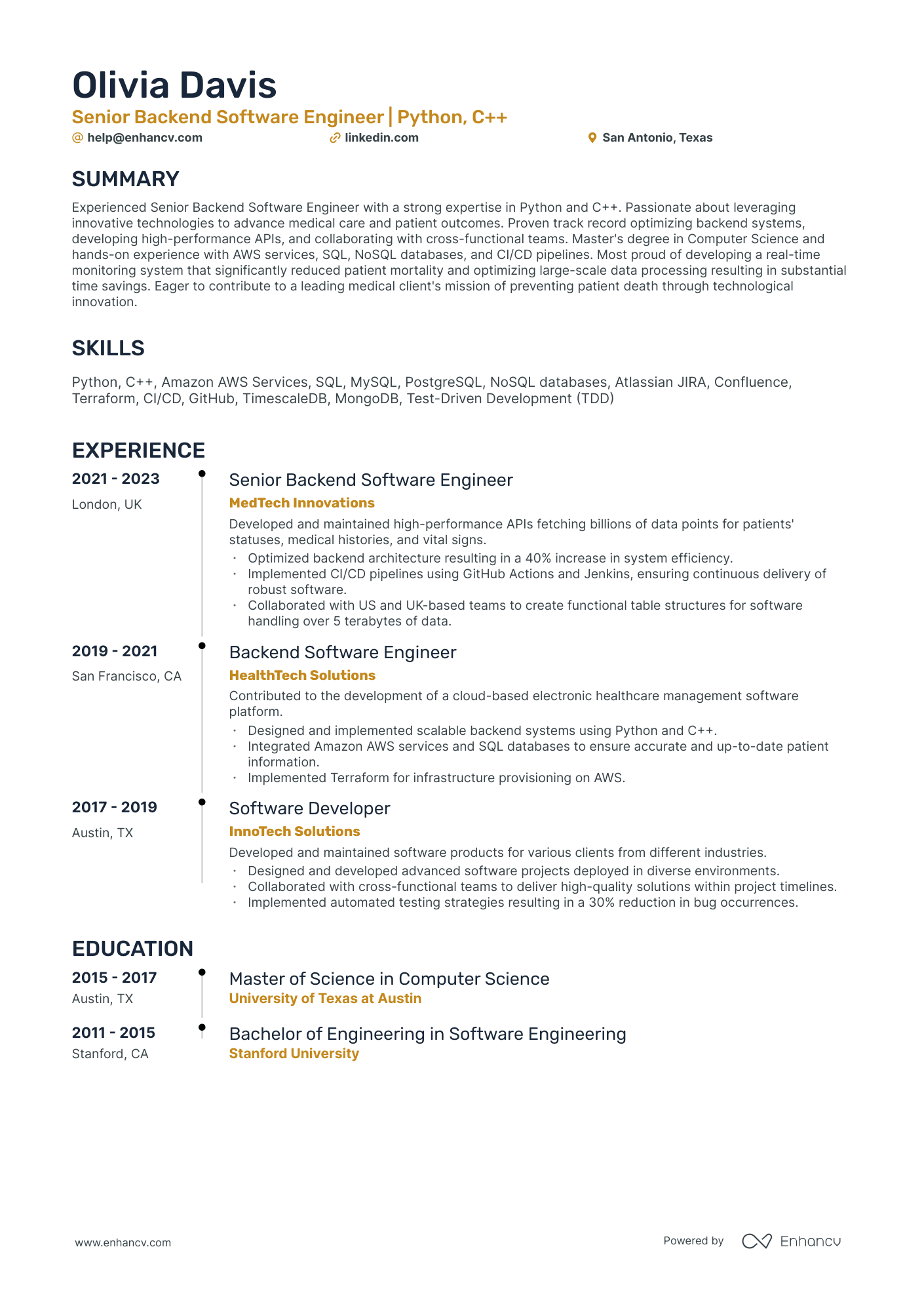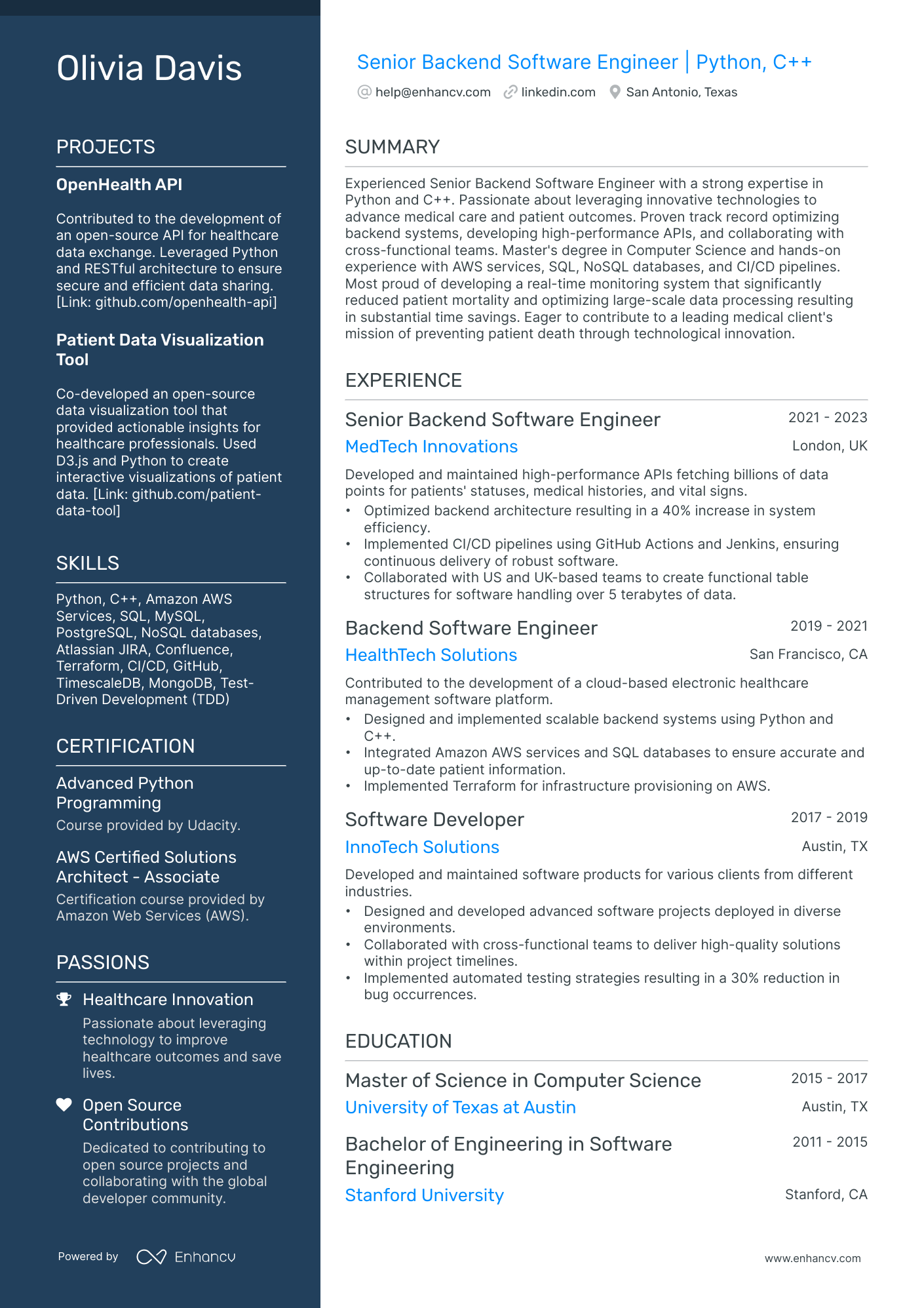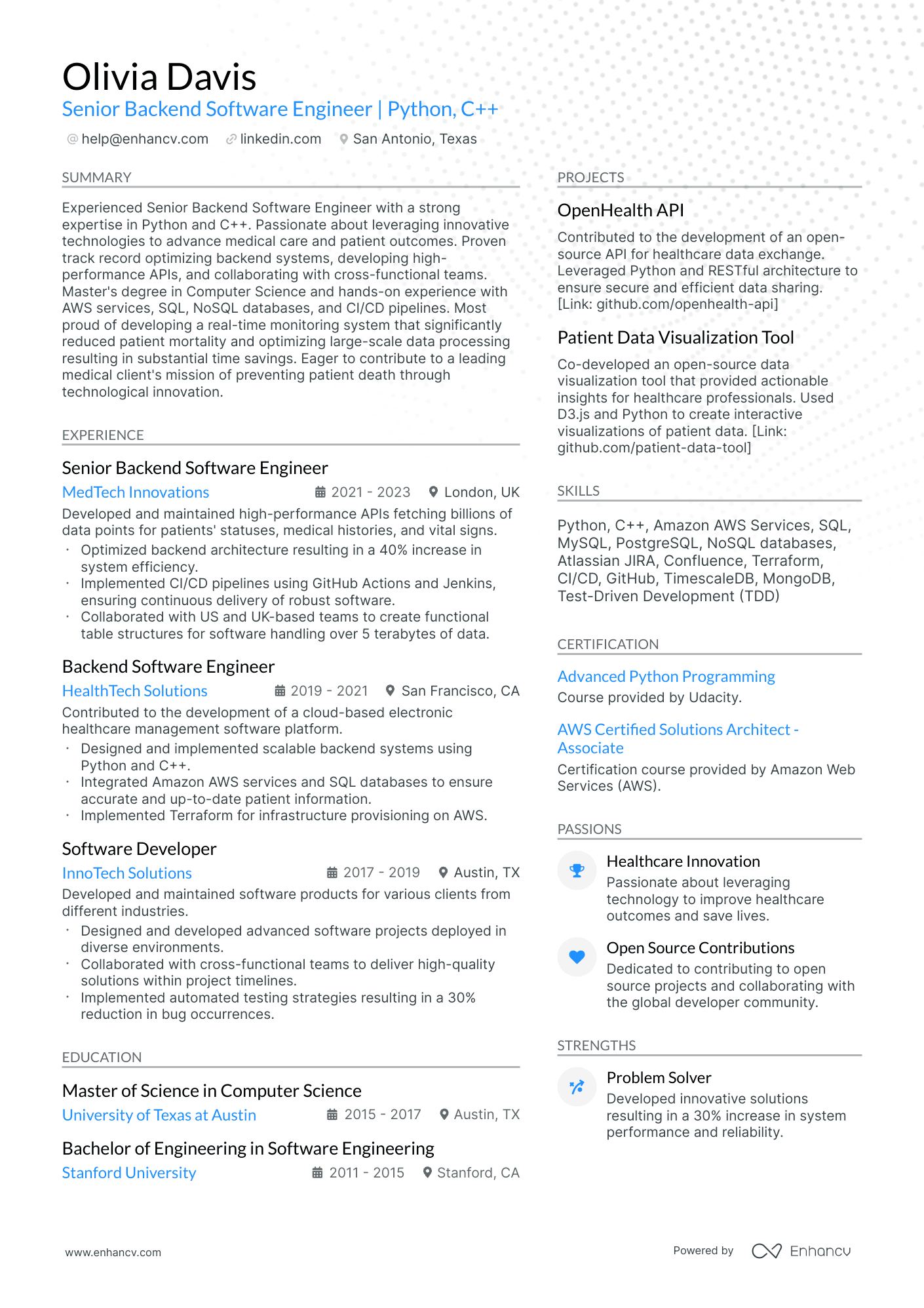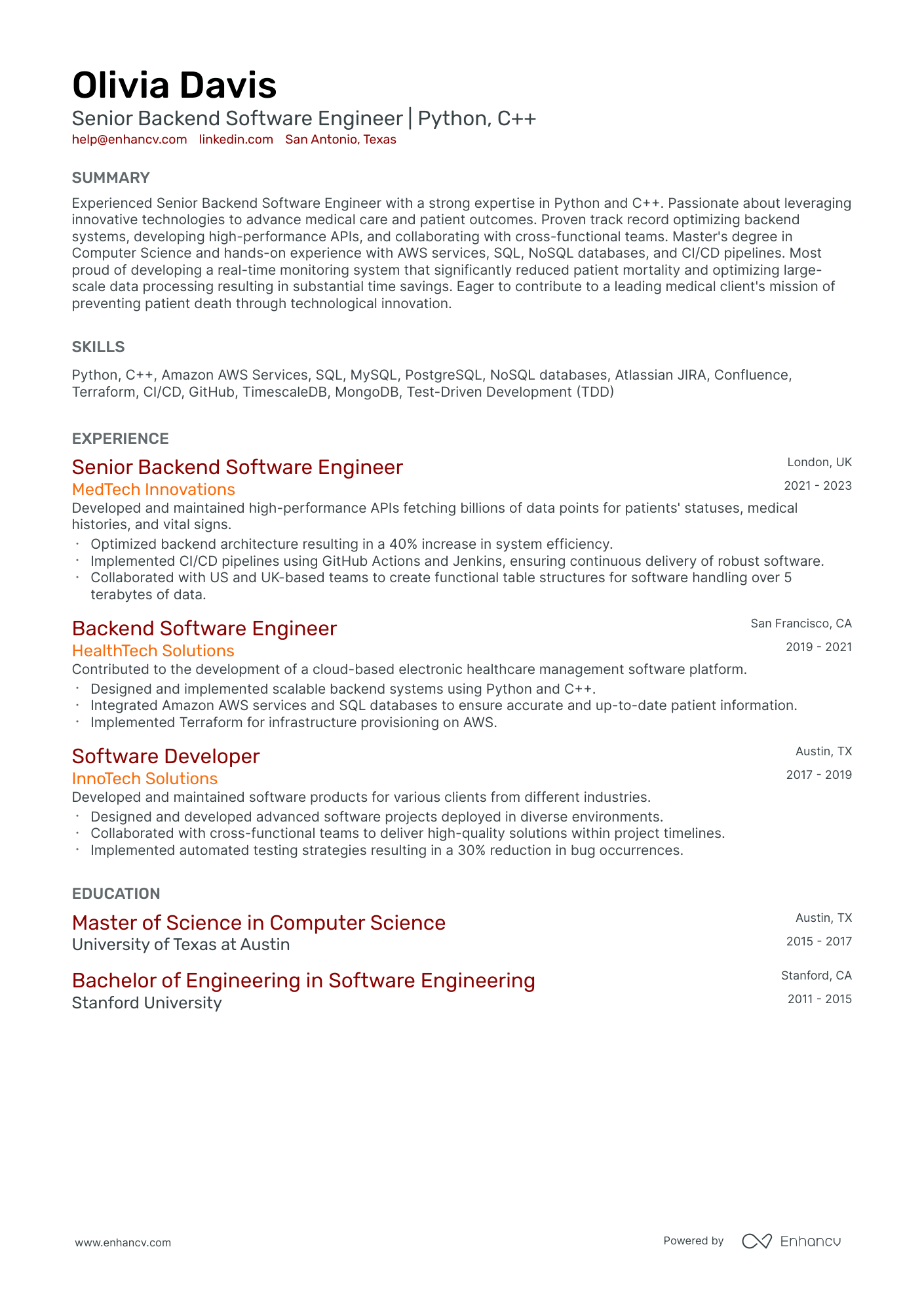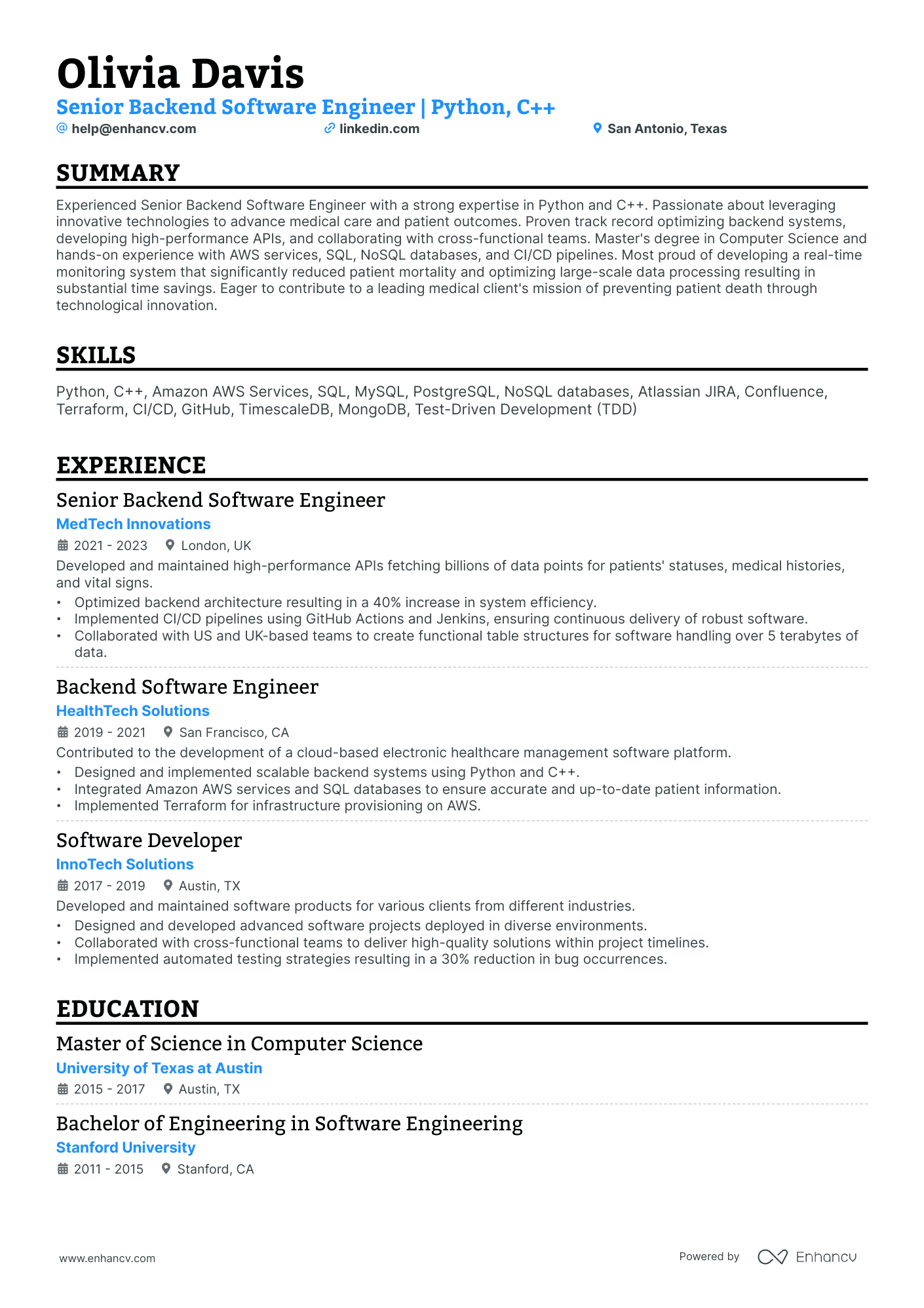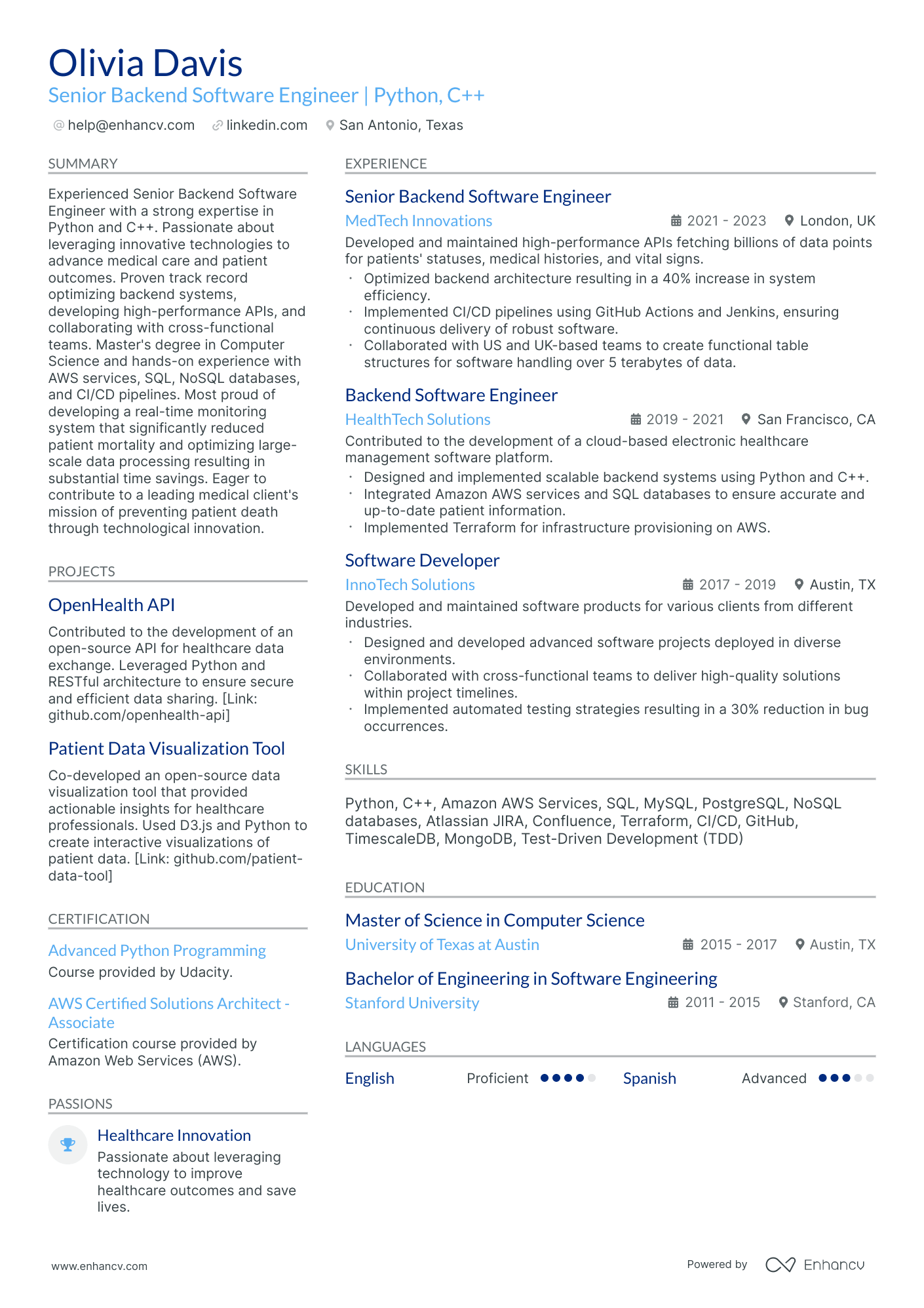One significant challenge for platform engineers is illustrating their broad set of skills - from maintaining cloud infrastructure to building scalable systems - in a concise and impactful way on their resume. Our guide can assist with this by providing tailored advice on how to effectively showcase diverse technical capabilities, giving examples of action-oriented language for each skill, and tips on structuring them to catch the attention of recruiters.
Our platform engineer guide will help you perfect your resume by explaining you how to:
- Alight your platform engineer resume with the role you're applying for ensuring it will be read by the applicant tracking system.
- Tailor your specific platform engineer experience to get the attention of recruiters.
- List your relevant education to impress hiring managers.
- Discover job-winning platform engineer professional resume examples to inspire writing yours.
Recommended reads:
Styling your platform engineer resume: layout and format
Pondering the ideal length for your platform engineer resume? Experts suggest keeping it between one and two pages. Opt for the two-page format if you boast over a decade of pertinent experience. Moreover, the resume format you choose is pivotal in showcasing your experience. Consider the:
- Reverse-chronological resume format to spotlight your career journey;
- Functional skill-based resume format if you're light on experience but want to emphasize skills;
- Hybrid resume format to provide recruiters a comprehensive view of both your experience and skills.
Here are some additional tips for your platform engineer resume layout:
- Keep your headline straightforward: mention the job you're targeting, a notable certification abbreviation, or your professional specialty;
- Always customize your platform engineer resume for the specific role, aligning job requirements with your experience in various resume sections;
- After finalizing your resume, save it as a PDF (unless instructed otherwise) to maintain its readability and layout consistency.
Upload your resume
Drop your resume here or choose a file. PDF & DOCX only. Max 2MB file size.
Pro tip
Your resume will likely be processed by an Applicant Tracking System (ATS). Ensure your header, summary, or objective incorporates essential skills required for the role.
Essential student ambassador resume sections for a comprehensive overview:
- Header: Enables recruiters to swiftly access your contact details and peruse your latest work portfolio.
- Summary or Objective: Offers a snapshot of your career milestones and aspirations.
- Experience: Demonstrates alignment with job prerequisites and highlights your tangible contributions.
- Skills: Captures the full spectrum of your expertise, making you a compelling student ambassador candidate.
- Education & Certifications: Bridges potential experience gaps and underscores your dedication to the field.
What recruiters want to see on your resume:
- Experience with cloud platforms (like AWS, GCP, Azure) and Infrastructure as Code tools (like Terraform, Ansible)
- Understanding of containerization technologies (like Docker, Kubernetes)
- Proficiency in scripting languages (like Python, Bash, or Ruby)
- Knowledge of CI/CD pipelines and experience with DevOps tools (like Jenkins, GitLab CI, or CircleCI)
- Demonstrated problem-solving skills, especially within complex, distributed systems
Recommended reads:
Writing your platform engineer resume experience
Here are some quick tips on how to curate your platform engineer professional experience:
- Always ensure that you quantify your achievements by implementing the Situation-Task-Action-Result framework;
- When writing each experience bullet, make sure you're using active voice;
- Stand out by including personal skills you've grown while at the job;
- Be specific about your professional experience - it's not enough to say you have great communication skills, but rather explain what your communication track record led to?
Wondering how other professionals in the industry are presenting their job-winning experience? Check out how these platform engineer professionals put some of these best practices into action:
- Designed and implemented scalable microservices architecture for a cloud-based platform, resulting in a 30% reduction in response time.
- Developed automated deployment processes using CI/CD pipelines, increasing deployment efficiency by 40%.
- Collaborated with cross-functional teams to resolve critical production issues, ensuring high availability of the platform.
- Led the migration of legacy systems to a containerized infrastructure, improving scalability and reducing infrastructure costs by 25%.
- Implemented monitoring and alerting solutions, reducing incident response time by 50%.
- Integrated third-party APIs into the platform, expanding its functionality and enabling new business opportunities.
- Designed and developed highly available and fault-tolerant infrastructure using Kubernetes and AWS services.
- Optimized database performance by implementing indexing strategies, resulting in a 20% reduction in query response time.
- Implemented security measures, including encryption and access controls, to ensure data privacy and compliance.
- Architected and deployed a serverless computing framework, reducing operational costs by 30%.
- Implemented infrastructure-as-code practices, increasing development team productivity by 40%.
- Led the migration to a cloud-native platform, improving scalability and reducing time-to-market for new features.
- Collaborated with DevOps teams to automate infrastructure provisioning using tools like Terraform, resulting in a 50% reduction in deployment time.
- Developed data pipelines and ETL processes to extract, transform, and load large datasets, enabling real-time analytics.
- Implemented disaster recovery strategies, ensuring business continuity during critical system failures.
- Designed and implemented a highly scalable event-driven architecture for processing real-time data streams, increasing system throughput by 40%.
- Optimized resource allocation using container orchestration platforms like Docker Swarm, leading to a 20% reduction in infrastructure costs.
- Collaborated with software development teams to define platform requirements and provide technical guidance throughout the development lifecycle.
- Built and maintained CI/CD pipelines using Jenkins, GitLab, and Ansible, reducing the time from code commit to deployment by 60%.
- Implemented log aggregation and monitoring solutions, enabling proactive identification and resolution of performance issues.
- Led a team of platform engineers in an Agile environment, fostering collaboration and delivering projects on schedule.
- Automated infrastructure provisioning and configuration management using tools like Puppet and Chef, resulting in a 30% reduction in manual effort.
- Implemented continuous integration processes, enabling faster feedback loops and reducing time-to-market for software releases.
- Designed and implemented disaster recovery plans and performed regular DR drills to ensure business continuity.
- Developed and maintained scalable containerized applications using orchestration platforms like Kubernetes, ensuring high availability and fault tolerance.
- Implemented distributed caching mechanisms to improve application performance, resulting in a 40% reduction in response time.
- Collaborated with cross-functional teams to identify and resolve performance bottlenecks, optimizing system resource utilization.
- Designed and implemented a multi-cloud infrastructure strategy, leveraging AWS, Azure, and Google Cloud Platform for enhanced scalability and redundancy.
- Optimized platform security by implementing IAM policies, network segmentation, and vulnerability scanning.
- Led the adoption of Infrastructure-as-Code practices using tools like Terraform and Ansible, improving infrastructure consistency and reproducibility.
Quantifying impact on your resume
<ul>
Addressing a lack of relevant platform engineer experience
Even if you lack direct platform engineer experience, you can still craft a compelling resume. Here's how:
- Highlight projects or publications that demonstrate your relevant skills or knowledge.
- Emphasize transferable skills, showcasing your adaptability and eagerness to learn.
- In your objective, outline your career aspirations and how they align with the company's goals.
- Consider a functional or hybrid resume format, focusing on skills over chronological experience.
Recommended reads:
Pro tip
Highlight what sets your experience apart. Incorporate metrics, feedback, and the tangible value you've added to organizations. This specificity ensures your resume remains pertinent and memorable.
Platform engineer resume skills: showcasing both hard and soft skills
Your platform engineer resume should show recruiters your range of skills. List the tools and software you use (hard skills) and how they fit into your daily tasks. But don't stop there. Share the personal traits (soft skills) you've gained from your experiences. Here's how:
- Showcase three top career achievements.
- For each achievement, mention a hard and a soft skill you used.
- Highlight unique skills that set you apart.
- Discuss how your skills improved the workplace or team culture.
Check our list for popular hard and soft skills in the industry.
Top skills for your platform engineer resume:
Kubernetes
Docker
Terraform
AWS
Azure
Git
CI/CD
Linux
Networking
Monitoring Tools (e.g., Prometheus, Grafana)
Problem Solving
Collaboration
Communication
Adaptability
Critical Thinking
Time Management
Attention to Detail
Creativity
Project Management
Teamwork
Pro tip
Double-check the spelling of all skills and tools on your resume. Remember, software like the Applicant Tracker System (ATS) scans for these details.
Highlighting your educational and certification milestones on your platform engineer resume
While skills alignment is increasingly prioritized, your educational background and certifications still play a pivotal role in establishing credibility.
To effectively present your academic and certification achievements:
- Detail your educational journey, including the institution and duration.
- Highlight recent and relevant certifications, showcasing your commitment to continuous learning.
- Be concise; focus on the skills and knowledge gained rather than exhaustive details.
- If a certification is in progress, mention the expected completion date.
Remember, authenticity is key. If a certification is pending, be transparent about it.
Best certifications to list on your resume
- AWS Certified Solutions Architect - Associate (SAA-C02) - Amazon Web Services (AWS)
- Certified Kubernetes Administrator (CKA) - Cloud Native Computing Foundation (CNCF)
- Certified Kubernetes Application Developer (CKAD) - Cloud Native Computing Foundation (CNCF)
- Red Hat Certified Engineer (RHCE) - Red Hat
Pro tip
Remember, certifications can be woven into various resume sections, like experience or summary. Detail how a particular certification enhanced your performance or opened new opportunities.
Recommended reads:
Adding a summary or objective to your platform engineer resume
One of the most crucial elements of your professional presentation is your resume's top one-third.
This most often includes:
- Either a resume summary - your career highlights at a glance. Select the summary if you have plenty of relevant experience (and achievements), you'd like recruiters to remember about your application.
- Or, a resume objective - to showcase your determination for growth. The perfect choice for candidates with less experience, who are looking to grow their career in the field.
If you want to go above and beyond with your platform engineer resume summary or resume objective, make sure to answer precisely why recruiters need to hire you.
What is the additional value you'd provide to the company or organization?
Now here are examples from real-life platform engineer professionals, whose resumes have helped them land their dream jobs:
Resume summary and objective examples for a platform engineer resume
- Accomplished platform engineer with a decade's worth of experience in managing and optimizing large-scale cloud environments. Proven ability in implementing agile methodologies and bolstering system security. Drove a 30% increase in system efficiency at ABC Corp by leading a cross-functional team.
- Senior Software Developer making a strategic career transition into platform engineering. Equipped with 8 years of experience in software development using Python, Java, and C#. Proficient in AWS and Kubernetes, aiming to leverage these skills to enhance platform scalability and reliability.
- Experienced Data Scientist keen to transfer into platform engineering. Possessing advanced knowledge of machine learning algorithms and data visualization techniques. Also proficient in Docker and Jenkins, eager to apply these competencies to improve platform performance and stability.
- Platform engineer with over 15 years of experience specializing in Linux-based infrastructure, cloud computing (Azure and Google Cloud), and DevOps methodologies. Orchestrated the successful migration of XYZ Inc.'s infrastructure to the cloud, improving operational efficiency by 25%.
- Motivated Computer Science graduate aspiring to launch a career as a platform engineer. With a strong academic foundation in cloud computing and DevOps practices, I am determined to utilize my skills in a practical environment to streamline processes and enhance platform functionality.
- Recent IT graduate seeking to apply theoretical knowledge in a practical setting as a platform engineer. Adept in coding languages such as Python and Java, with a burgeoning interest in containerization technologies like Docker and Kubernetes.
Enhancing your platform engineer resume with additional sections
Make your platform engineer resume truly distinctive by adding supplementary sections that showcase:
- Awards that underscore your industry recognition.
- Projects that bolster your application's relevance.
- Hobbies, if they can further your candidacy by revealing facets of your personality.
- Community involvement to highlight causes you champion.
Key takeaways
- Structure your resume to spotlight career highlights and relevance to the role.
- Keep your resume concise, prioritizing relevant experiences.
- Detail specific achievements that showcase your suitability for the role.
- Both technical and interpersonal skills should be evident throughout your platform engineer application.


